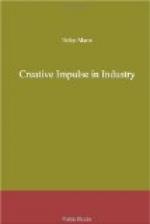The ownership of many things, which mass production has made possible, the intensive cultivation of the desire to own, has added another element to the corruption of workmanship and the depreciation of its value. Access to a mass of goods made cheap by machinery has had its contributing influence in the people’s depreciation of their own creative efforts. As people become inured to machine standards, they lose their sense of art values along with their joy in creative effort, their self regard as working men and their personal equation in industrial life.
Where the motive of individuals who engage in industry is the desire to possess, the rational method of gaining possession is not by the arduous way of work but of capture. The scheme of capture is a scheme whereby you may get something for (doing) nothing; nothing as nearly as possible in the way of fabrication of goods; something for the manipulation of men; something for the development of technology and mechanical science; and high regard for the manipulation of money. “Doing nothing” does not mean that manual workers, managers of productive enterprises, speculators in the natural resources of wealth production and manufactured goods, as well as financiers, are not busy people, or that their activity does not result in accomplishment. They are indeed the busy people and their accomplishment is the world’s wealth. Nevertheless the intention of all and the spirit of the scheme is to do as near nothing as possible in exchange for the highest return. The whole industrial arrangement is carried on without the force of productive intention; it is carried forward against a disinclination to produce.
I have said that industry was shorn of adventure for the common man. Adventure in industrial enterprise is the business man’s great monopoly. His impetus is not due to his desire to create wealth but to exploit it, and he secures its creation by “paying men off.” Commonly he is peevishly expectant that those he pays off will have a creative intention toward the work he pays them to do, although in the scheme of industry which he supports the opportunity provided for such intention is negligible. An efficiency engineer estimated that there is a loss in wealth of some fifty per cent, due to the inability of the business man to appraise the creative possibilities in industry.
When exploitation of wealth is referred to, those who own it are generally meant. But exploitation of wealth is the intention of the worker as well as of the business man. To get, as I have said, something for (doing) nothing is the dominating motif in the industrial world. It is supposed to reflect the self-interest of individuals, to reflect, that is, their economic needs.




